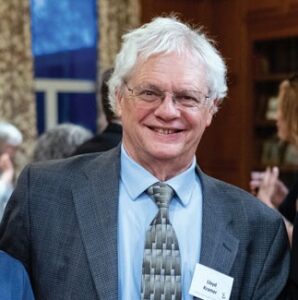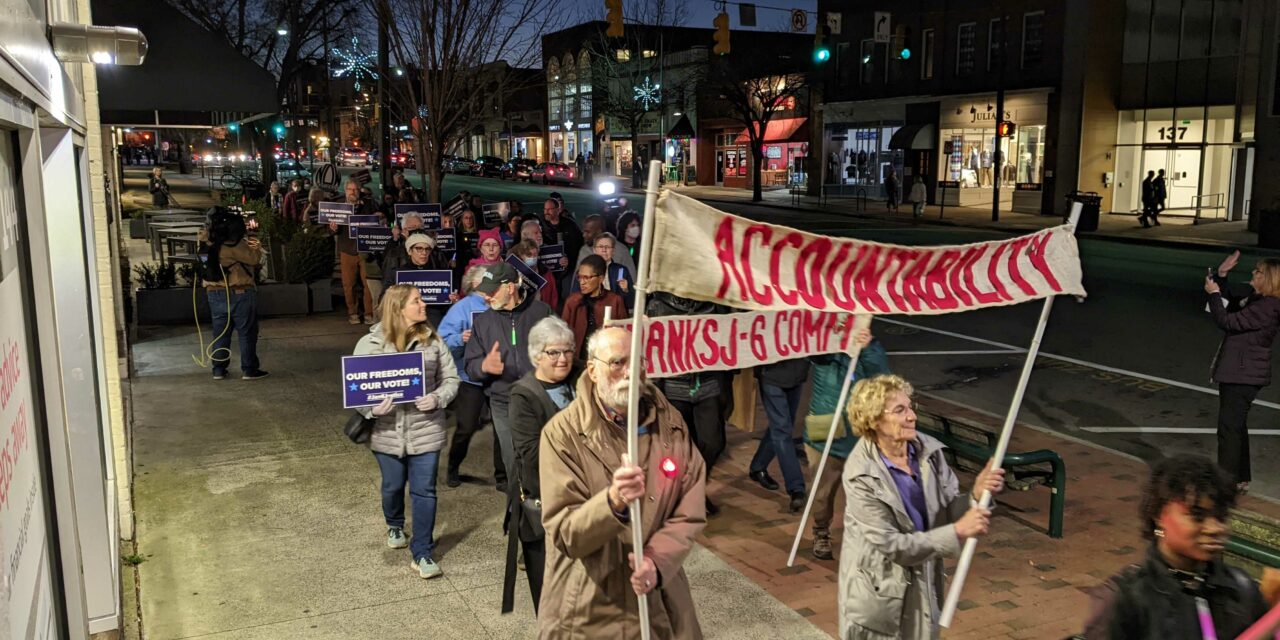Often attributed to Mark Twain — perhaps mistakenly, since no historical source shows he actually made the statement — “History doesn’t repeat itself, but it often rhymes” is a common and apt refrain when discussing the connection between historical perspectives and current events. By drawing on knowledge of what happened in the past, and why, we are better able to understand the flow and direction of the history collectively created in each new day.
“Past Rhymes With Present Times” is a new series by Lloyd S. Kramer exploring historical context and frameworks, and how the foundations of the past affect the building of the future.
Americans disagree about all kinds of ideas and public policies, but almost everyone seems to agree on the value of personal and political freedom. Descriptions of freedom are forever diverging, however, because people define freedom from different social positions and with different historical perspectives.
Historians have long debated the contrasting themes of “negative” freedom (free from the interventions of public institutions) and “positive” freedom (free to participate in public institutions) which shape political arguments in American society. Modern conservatism is often linked to beliefs in negative freedom, whereas modern liberalism is often linked to beliefs in positive freedom, yet these distinctions become blurred in real-world conflicts.
The most vehement “conservatives” wave yellow flags emblazoned with a coiled snake and a defiant eighteenth-century warning, “Don’t Tread on Me,” to convey their anger about governmental threats to personal freedoms. Yet these same flag wavers may demand government interventions to ban abortions, same-sex marriages, or the circulation of specific books in schools and libraries.
Although “liberals” are more likely to affirm a “positive” freedom to attend government-funded public schools, create environmental protections, and receive equitable health care, they may also embrace a “negative” freedom to explain why Americans should be free from government restrictions on reproductive health care, same-sex marriages, or the open circulation of books in schools and libraries.
The meanings of freedom are thus constantly reinterpreted in American political debates that need to be expanded in these times of extreme political disruption. Trumpism and its supportive media are promoting a very narrow definition of self-sufficient “freedom” to justify policies such as low taxes on wealth, reduced funding for public institutions, liberation from medical vaccines, the removal of environmental regulations, and the blockage of immigration from foreign countries. Historical knowledge of past conflicts therefore offers (as always) an empowering resource for generating new debates about freedom and challenging the constricted ideological framework in which we’re now living.
Freedom and Public Institutions
Among the countless commentaries on the meaning of freedom, I’ve found helpful insights in two recent books by the historian Timothy Snyder, On Tyranny (2017) and On Freedom (2024). Snyder’s research focuses on authoritarian regimes that have dominated Eastern European countries from the era of Hitler-controlled Germany to the era of Putin-controlled Russia, so he understands why people should be “free from” government control of their speech, religion, publications, travel, and love lives.
Yet Snyder insists that one-sided praise for negative freedom prevents us from understanding how we’re able to speak, learn, travel, worship, vote, and earn money because we have the positive freedom to participate in institutions that sustain and enrich our lives and choices in a free society. “Individual freedom,” Snyder notes in On Freedom, “is a social project and a generational one. For people to grow up in freedom, the right structures must already be in place when they are born.”
It’s obvious, of course, that infants cannot survive without the help of caregiving people and institutions, but “life, liberty, and the pursuit of happiness” also require the constant assistance of other people and institutions during every phase, activity, or need of our lives: education, health care, food, clothing, travel, jobs and careers, knowledge and wealth, sports and entertainment, safety, technology, politics, and all the other components of social life that allow us to act freely in the world and achieve our goals.
Individuals become “free to” act in unpredictable ways through social relationships that show why “no one becomes an individual alone.” Positive freedom, as Snyder explains it, “leads us back to one another… and leads us to treat one another as actors in history.” These social components of individual freedom thus become more understandable “when we think historically,” because historical knowledge helps us “see structures inherited from the past, plausible choices in the present, and multiple possibilities for the future.”
The knowledge and social relations that support democratic cultures can only grow or thrive when people recognize the value of public institutions and when they are free from fear. Snyder thus argues in his reflections on tyranny that we should “defend institutions” because “institutions help us to preserve decency.”
Vibrant institutions also help us overcome our fears of isolation and loss, so the declining respect for institutional communities contributes to the wider breakdown of a shared public culture. Trumpism’s sledgehammer assault on civil servants, journalists, educators, and scientists therefore attacks the social dimensions of freedom and undermines the public institutions that help Americans live safer, freer, and better-informed lives. Using anti-DEI critiques of institutional expertise to justify radical actions, the new presidential administration has launched a new kind of coup d’etat against long-established public agencies and funding processes that serve the daily work and well-being of people across all spheres of our democratic society.
Fear, Authoritarianism, and the Messages of January 6
Fear of “others” is a powerful emotional force in all authoritarian political movements, as we can see in the popular support for fear-evoking ethnic nationalists in every modern nation. The mobilization of fear also carried fascist leaders to power in Europe during the 1930s. But in contrast to those who gained power then (and now) by stoking anger against all “outsiders,” President Franklin Roosevelt firmly declared in his first inaugural address that “the only thing we have to fear… is fear itself—nameless, unjustified terror which paralyzes efforts to convert retreat into advance.”
Roosevelt therefore supported human freedom by rejecting fear and by refuting European fascists such as Benito Mussolini who declared that elections, democratic institutions, and equal human rights could never solve public problems. “Fascism denies that the majority… can direct human society,” Mussolini wrote in 1932, and “it affirms the immutable, beneficial, and fruitful inequality of mankind.”
President Roosevelt responded to the authoritarianism of Mussolini and Hitler in a famous State of the Union address on January 6, 1941. Describing the democratic institutions that separated Americans from European fascists, Roosevelt argued that “a good society” must confront authoritarian regimes “without fear” and oppose “the so-called new order of tyranny which the dictators seek to create.”
Americans should thus defend “human rights everywhere,” but Roosevelt specifically named the essential freedoms that must guide the struggle against those who wanted to destroy the institutions and traditions of democratic societies: freedom of speech, freedom of religion, freedom from material want, and freedom from fear of violent aggression. These “four freedoms” established a political foundation for the costly and ultimately victorious democratic struggle against fascist authoritarianism.
Roosevelt’s robust defense of free institutions on January 6, 1941, would nevertheless be challenged again when Donald Trump sent his violent followers to stop the Congressional certification of a free American election on January 6, 2021, and when Judge Richard Myers of the US District Court for Eastern North Carolina ruled on January 6, 2025, that the state Board of Elections should not certify Allison Riggs’s victory over Jefferson Griffin in the recent election for a seat on North Carolina’s Supreme Court. Indeed, Judge Myers accepted Griffin’s claim that this Court’s current judges could decide which votes should be counted or set aside in the election of their own future colleague.
Franklin Roosevelt made January 6 a historic day in the defense of freedom and democracy, but Donald Trump and Jefferson Griffin have asserted their own January 6th ambitions to overturn the democratic principles that shaped America’s anti-fascist campaigns during the Second World War.
Although debates about the complexities of human freedom will continue to evolve, the positive social practices that shape free institutions, free elections, and free lives will only survive and flourish when people steadfastly defend the “four freedoms” and human rights that sustained Roosevelt’s forceful opposition to fascism in the 1940s.

Photo via Lindsay Metivier
Lloyd Kramer is a professor emeritus of History at UNC, Chapel Hill, who believes the humanities provide essential knowledge for both personal and public lives. He has recently published “Traveling to Unknown Places: Nineteenth-Century Journeys Toward French and American Selfhood,” but his historical interest in cross-cultural exchanges also shaped earlier books such as “Nationalism In Europe and America: Politics, Cultures, and Identities Since 1775” and “Lafayette in Two Worlds: Public Cultures and Personal Identities in an Age of Revolutions.”


